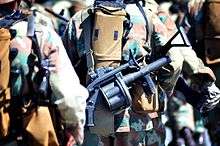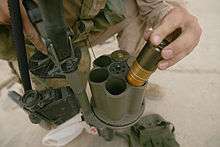Milkor MGL
| Milkor MGL | |
|---|---|
 A U.S. Marine looks through the M2A1 reflex sight on a newly-issued M32 MGL (MGL-140) in September 2006. | |
| Type | Grenade launcher |
| Place of origin | South Africa |
| Service history | |
| In service | 1983–present |
| Used by | See Users |
| Wars |
Colombian conflict Syrian Civil War[1] 2013 Lahad Datu standoff |
| Production history | |
| Designer | Andries C. Piek[2] |
| Designed | 1980 |
| Manufacturer | Milkor (Pty) Ltd |
| Produced | 1983–present |
| Variants | See Variants |
| Specifications | |
| Weight | 5.3 kg (12 lb) |
| Length |
778 mm (30.6 in) stock extended, 565 mm (22.2 in) stock folded (MGL) 812 mm (32.0 in) stock extended, 711 mm (28.0 in) stock folded (MGL-140) |
| Barrel length | 300 mm (11.8 in) (MGL) |
|
| |
| Cartridge |
40×46mm grenade 40×51mm grenade (SuperSix) |
| Action | Double-action |
| Rate of fire |
3 rounds/sec (MGL) (rapid fire) 18-21 rounds/min (sustained) |
| Muzzle velocity | 76 m/s (250 ft/s) (MGL) |
| Effective firing range |
375 m (410 yd) 800 m (870 yd) (ERLP ammunition) |
| Maximum firing range | 400 m |
| Feed system | 6-round, revolver-type swing out cylinder |
| Sights |
Armson OEG collimator sight in quadrant (MGL) M2A1 reflex sight (M32) |
The Milkor MGL (Multiple Grenade Launcher) is a lightweight 40 mm six-shot revolver-type grenade launcher (variations also fire 37/38mm) developed and manufactured in South Africa by Milkor (Pty) Ltd. The MGL was demonstrated as a concept to the South African Defence Force (SADF) in 1981. The operating principle was immediately accepted and subjected to a stringent qualification program. The MGL was then officially accepted into service with the SADF as the Y2. After its introduction in 1983, the MGL was gradually adopted by the armed forces and law enforcement organizations of over 50 countries. Total production since 1983 has been more than 50,000 units.
The MGL is a multiple-shot weapon, intended to significantly increase a small squad's firepower when compared to traditional single-shot grenade launchers like the M203. The MGL is designed to be simple, rugged, and reliable. It uses the well-proven revolver principle to achieve a high rate of accurate fire which can be rapidly brought to bear on a target. A variety of rounds such as HE, HEAT, anti-riot baton, irritant, and pyrotechnic can be loaded and fired as fast as the trigger can be pulled; the cylinder can be loaded or unloaded rapidly to maintain a high rate of fire. Although intended primarily for offensive and defensive use with high-explosive rounds, with appropriate ammunition the launcher is suitable for anti-riot and other security operations. A newly patented modification allows the MGL to fire less lethal (very low pressure) rounds.
Design
Operating mechanism
The MGL is a low-velocity, shoulder-fired 40 mm grenade launcher with a six-round spring-driven revolver-style magazine capable of accepting most 40×46mm grenades. The spring-driven cylinder rotates automatically while firing, but it must be wound back up after every reloading.
Features

The MGL grenade launcher consists of a lightweight, progressively rifled steel barrel, sight assembly, frame with firing mechanism, spring-actuated revolving cylinder magazine, and a folding stock. The weapon has a fire selector safety switch just above the rear pistol grip which can be operated from either side. The launcher cannot be accidentally discharged if dropped. The launcher is loaded by releasing the cylinder axis pin and swinging the steel frame away from the cylinder. The rear of the cylinder (including the pistol grip) is unlatched and pivoted counter-clockwise to expose the chambers during reloading. By inserting the fingers into the empty chambers and rotating the aluminium cylinder it is then wound against its driving spring. The grenades are then inserted into the chambers, one-by-one (because the cylinder cannot be removed), the frame closed, and the axis pin re-engaged to lock. When the trigger is pressed a double-action takes place and the firing pin is cocked and released to fire the grenade. Gas pressure on a piston unlocks the cylinder and allows the spring to rotate it until the next chamber is aligned with the firing pin, whereupon the next round can be fired. If a misfire occurs the trigger can be pulled repeatedly.
Sights
The Y2, amongst other models, is equipped with the Armson Occluded Eye Gunsight (OEG), a collimator sight which provides a single aiming post. The shooter aims with both eyes open and the post is superimposed onto the target, both being in focus. The OEG on the Y2 is designed as an aid to range estimation, the post being equal to the height of a man at 200 metres. It is also fitted with tritium illumination for low light operation which has a life of at least ten years. The range quadrant is graduated in 25 m increments.
Accessories
Each MGL is supplied with a sling, a cleaning kit and a user's manual.
Variants
Several upgrades were made to the original design in the last decade. After over 12 years of production and more than a decade of user feedback from different countries around the world it became evident that a redesign of some component groups would make the weapon even more user-friendly and reliable, while at the same time simplifying maintenance. This development, known as the MGL Mk 1 was introduced to the market in 1996. All weapons previously supplied can be upgraded to the Mk 1 configuration. Parts, such as the steel barrel, are interchangeable with a minimum of workshop modifications involving a few special tools and cutting dies.
Two "product improved" variants were introduced in 2004. The first is the Mk 1S, which replaces the aluminum frame of the Mk 1 with a stronger stainless steel body, a conventional trigger unit, and Picatinny rail support at the top, sides and bottom of the forend. The second variant is the Mk 1L, with the same features as the Mk 1S, but with a 140 mm (5.5 in) long cylinder to fit special-purpose grenades such as tear gas canisters and less-lethal impact rounds that are too long to fit in the other models' shorter cylinder. The Mk 1L also features a sliding buttstock.[3][4]

In 2006 the Milkor 37/38mm Multiple Anti-Riot (MAR) replaced the 40mm less-lethal Yima. The MAR is largely identical to other MGL models, but is adapted to fire standard 37/38mm less-lethal riot control rounds available today.[3]
The Milkor SuperSix MRGL (Multi-range Grenade Launcher) was developed in 2012 and features a new recoil reduction system, redesigned stock, strengthened construction and new optics.[3] The SuperSix MRGL is capable of firing a wide range of standard (low velocity, LV) and medium velocity (MV) munitions, which enables the user to engage a wider range of targets than possible with previous launchers, with a maximum range of 800 to 1200 metres.[5] Rounds can be fired in rapid succession of six rounds in less than 3 seconds (operator dependent) and has a standard six-shot area coverage of at least 20m × 60m.[6]
Milkor USA
Milkor USA, Inc. is an American company that produces copies of the Milkor MGL. Milkor (Pty) Ltd has no affiliation or working relationship with Milkor USA.[2]
Milkor USA previously produced the Mk 1S as the MGL-105, and the Mk 1L as the MGL-140, both referring to their respective chamber lengths.
In 2005 the United States Marine Corps procured 200 MGL-140s, designated as the "M32 Multi-shot Grenade Launcher" (M32 MGL or M32 MSGL). They were initially field tested in 2006. The M32 is equipped with the M2A1 reflex sight, an AAA battery–powered sight with infrared settings for night operations. Its elevation adjusts in 25 meter increments and compensates for drift, and its casing features a Picatinny rail on top.[7][8]
In 2014, Milkor USA dropped the MGL-105 and MGL-140, and introduced a shorter-barreled variant, the M32A1.[9][10] Despite the shorter barrel (8 inches instead of 12), it weighs the same as the M32, because its receiver, stock and other parts of the weapon were strengthened, in anticipation of higher pressure medium velocity rounds sought by United States Special Operations Command. The M32A1 has been adopted by the U.S. Marine Corps as the M32A1 Multi-shot Grenade Launcher, and by USSOCOM as the Mk 14 Mod 0.[7]
Users
See also
References
- ↑ GoPro footage of Syrian rebels storming government held positions in Latakia (in Arabic). Latakia, Syria. 2015. Event occurs at 2:22. Archived from the original on 1 February 2016. Retrieved 14 August 2015.
- 1 2 "Milkor (Pty) Ltd: About Us". Retrieved 11 July 2016.
- 1 2 3 "Modern Firearms - Milkor MGL". Retrieved 23 November 2014.
- 1 2 3 4 5 6 7 8 9 10 11 12 13 14 15 "Milkor MGL-140 Multi-Range Grenade Launcher (MRGL) (2008)". Military Factory. 15 June 2015. Retrieved 5 September 2015.
- ↑ Martin, Guy (19 July 2013). "Milkor showcasing new products". Retrieved 23 November 2014.
- ↑ "Milkor SuperSix". Archived from the original on 1 November 2013.
- 1 2 3 Pike, John. "M32 Multi-Shot Grenade Launcher Mk 14 Multi-Shot Grenade Launcher". Retrieved 23 November 2014.
- ↑ "Acoratex Catalogo 2008" (PDF) (in Spanish). p. 17. Archived from the original on 1 April 2010.
- ↑ "Milkor USA website as of 12 Jan 2014". Archived from the original on 12 January 2014. Retrieved 11 July 2016.
- ↑ "Milkor USA website as of 7 Feb 2014". Archived from the original on 7 February 2014. Retrieved 11 July 2016.
- ↑ ""BDMilitary"".
- ↑ "Brazilian Army". Archived from the original on 22 February 2009.
- ↑ "Grenade Launcher MGL" (in Spanish). Indumil. Archived from the original on 7 July 2011. Retrieved 9 February 2012.
- 1 2 3 Jones, Richard D. (27 January 2009). Jane's Infantry Weapons 2009/2010 (35th ed.). Jane's Information Group. ISBN 978-0-7106-2869-5.
- ↑ "Metallic d.o.o Brochure" (PDF). Metallic d.o.o. Archived from the original (PDF) on 10 September 2011. Retrieved 2012-02-09.
- ↑ "Hærens Militærpoliti (Army Military Police)" (PDF).
- ↑ "Armament of the Georgian Army". Retrieved 23 November 2014.
- ↑ "Multi Grenade Launcher 40 mm". Ordnance Factory Board. Retrieved 2012-02-14.
- ↑ IBP USA (2007). Malaysia Army Weapon Systems Handbook. Int'l Business Publication. pp. 71–73. ISBN 978-1-4330-6180-6.
- ↑ "PASKAU Malaysian Special Air Service Weapons". Military Factory. Retrieved April 14, 2016.
- ↑ "MGL".
- ↑ "USMC’s New M-32s/ MSGLs: Hitting the Field".
- ↑ "Milkor grenade launcher".
- ↑ "home". Army.mil.za. 13 December 2010. Retrieved 26 February 2013.
- ↑ "2015부산국제조선해양대제전 국제 해양 방위산업전". Flickr - Photo Sharing!. Retrieved 2016-04-08.
- ↑ SoldF.com. "Försöksvapen: Multi Grenade Launcher 40" (in Swedish).
- ↑ "圖文:攻堅利器" (in Taiwanese Mandarin). Archived from the original on 28 July 2011.
- ↑ "Royal Thai Navy Inventory". Archived from the original on 17 October 2011.
- ↑ "MKEK - Makina ve Kimya Endüstrisi Kurumu". Retrieved 23 November 2014.
- ↑ "Turkish Army Land Forces military equipment and vehicles of Turkey". Archived from the original on 9 January 2015. Retrieved 23 November 2014.
- ↑ "SLAHLAR". Retrieved 23 November 2014.
- ↑ "Content not found".
- ↑ "Marines Get New Six-Shot 40mm Grenade Launcher: Meet the M32 MGL". Defense Review. 17 March 2006. Retrieved 26 February 2013.
- ↑ "Viện Vũ khí thuộc Tổng cục Công nghiệp Quốc phòng Việt Nam đã chế tạo thành công súng phòng lựu cỡ 40mm" (in Vietnamese). Dat Viet. 2012-01-29. Archived from the original on 3 February 2012. Retrieved 2012-02-09.
External links
| Wikimedia Commons has media related to Milkor MGL. |
- Milkor (Pty) Ltd
- Martin Electronics, Inc. – 40 mm ammunition
- M433 40 mm HEDP grenade specs
- The Infantry's Explosive Punch (Asian Military Review article)